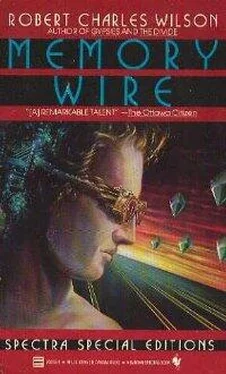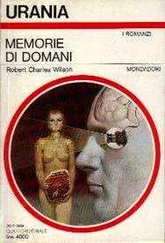Robert Wilson - Memory Wire
Здесь есть возможность читать онлайн «Robert Wilson - Memory Wire» весь текст электронной книги совершенно бесплатно (целиком полную версию без сокращений). В некоторых случаях можно слушать аудио, скачать через торрент в формате fb2 и присутствует краткое содержание. Год выпуска: 1987, ISBN: 1987, Издательство: Bantam Spectra, Жанр: Фантастика и фэнтези, на английском языке. Описание произведения, (предисловие) а так же отзывы посетителей доступны на портале библиотеки ЛибКат.
- Название:Memory Wire
- Автор:
- Издательство:Bantam Spectra
- Жанр:
- Год:1987
- ISBN:978-0-553-26853-9
- Рейтинг книги:4 / 5. Голосов: 1
-
Избранное:Добавить в избранное
- Отзывы:
-
Ваша оценка:
- 80
- 1
- 2
- 3
- 4
- 5
Memory Wire: краткое содержание, описание и аннотация
Предлагаем к чтению аннотацию, описание, краткое содержание или предисловие (зависит от того, что написал сам автор книги «Memory Wire»). Если вы не нашли необходимую информацию о книге — напишите в комментариях, мы постараемся отыскать её.
Memory Wire — читать онлайн бесплатно полную книгу (весь текст) целиком
Ниже представлен текст книги, разбитый по страницам. Система сохранения места последней прочитанной страницы, позволяет с удобством читать онлайн бесплатно книгу «Memory Wire», без необходимости каждый раз заново искать на чём Вы остановились. Поставьте закладку, и сможете в любой момент перейти на страницу, на которой закончили чтение.
Интервал:
Закладка:
The sound came up instantly. Clatter of ancient tools. Human voices ringing off distant cliffs. Abyss of time. Formigas moving in insect lines up those clay steppes and rope ladders: it might have been yesterday or today or tomorrow. Keller reached for a fader, but his hand struck the volume slide instead. The clangor of voices and tools was suddenly deafening, a roaring in the booth. He blinked at the monitor and for one giddy instant believed he had actually entered the past, transported himself somehow back to Pau Seco, that he might turn and find Teresa beside him. He slapped the Enterkey.
The playback ceased. The booth filled up with silence.
When he could not bear the work any longer, he signed out and drove west. He had used a portion of the advance from Vasquez to rent a hotel room, but he didn’t head directly back. He drove west along a high, fast traffic artery until he hit the coastline, and then he turned north. On his left the Floats sprawled out to the distant gray line of the tidal dam. He drove through colonies and outposts of the cityplex, malltowns and industrial parks. He had gone miles before he understood where he was going.
Bad idea, he thought. It was a bad impulse that had brought him here: Angel sin. But he pulled off the highway when he spotted the sign.
Arts by the Sea. She had mentioned the name once, long ago.
It was not the newest or the best of these businesses. Bamboo walls sunk in a cracked concrete foundation, roof of chalky-red Spanish tile. The door rang a bell when he opened it. Inside, a buckled wooden floor supported shelves and display cases of thick protective glass gone gray with time.
The items on display were, in Keller’s judgment, fairly prosaic Float work. Soapstone carvings, junk collages, a few high-priced crystal paintings under glass. He gazed a while at a stylized trance landscape, bread-loaf hills rolling under an azure sky, treehouses like pagodas clustered in the foreground. Some real place, Keller thought, some Exotic venue wrenched out of time. He was staring at it when the proprietor pushed through a curtain from the rear of the store.
She was a chunky gray-haired woman in layered pastel skirts, and she regarded Keller across a chasm of suspicion. “Is there something you were especially interested in?”
“A certain artist,” he said. “I understand you sold some of her work. Her name is Teresa… Teresa Rafael.”
She looked at him more carefully now, his face and his clothes. “No,” she said finally. “We have nothing.”
Keller extracted the Pacific Credit gold card Vasquez had obtained for him. In fact his account was strictly limited, but the card itself was impressive. He slid it across the counter; the woman ran her finger over the embedded microchip. “She hasn’t displayed here for years. Her work has appreciated in value. You understand? She has a reputation now. A following.”
“I understand.”
The woman licked her lips. “In the back,” she said.
Keller followed her through the curtain. There were a dozen pieces in this smaller room—all “appreciated,” Keller assumed: it was a commonplace practice for street dealers to hold back the work of a promising newcomer. But he recognized instantly which of it was Teresa’s. “These,” the woman said loftily, “are early pieces.”
She must have been a girl when she did this, Keller thought. He was impressed. Some of the work was awkward; none of it was naive. A few pieces displayed the obvious skill and muted passion that had made her successful. Mostly they were junk sculptures, assembled out of pipe and copper wire and mechanical oddments scavenged from the old Float factories gutted in the fire; but she had polished and shaped the material until it seemed nearly alive, more liquid than solid.
“You’re familiar with the work?”
“No… not really.”
Under the woman’s alarmed stare he picked up a small piece of sculpture and examined it. The metallic tangle resolved into the image of a face. No—two faces. He rotated the piece in his hand.
A woman’s face, gaunt but curiously childlike in its sadness.
. And a child’s face, with an adult’s expression of fierce resolve.
The proprietor took it from him. Keller was startled; he restrained an impulse to take it back. She named a sum, and it was approximately the money Vasquez had entered into Keller’s account, minus living expenses. A huge amount. But he agreed without haggling.
He drove home with the piece beside him in the car, confused and faintly shocked at himself. He was like a sleepwalker, acting out some dream. He knew only that he wanted something from this knot of metal, something tangible; a piece of her, he thought, a relic, or that forbidden and finally dangerous thing—a memory.
In the morning he went back to the Network technical compound and called up yesterday’s work on the monitor.
The sight of it shocked him. He sat back in the cloistered silence of the editing booth and stared.
He had altered Teresa’s features to protect her anonymity. Standard procedure, and he had worked by rote. Successfully. It didn’t look like Teresa anymore.
But the face he had given her was Megan Lindsey’s.
CHAPTER 20
Stephen Oberg had stepped outside the bounds of propriety -often since the debacle at Pau Seco, but he did not feel authentically like an outlaw until the day he rented a cheap balsa in the Floats.
It was an outlaw place; he was an outlaw in it. The faces he saw along the market canals were furtive, obscure, hidden. He imagined he looked the same. A shadow-thing now, outside the bright thoroughfares of law and custom. The only light here was the beacon of his own intense desire; the abyss of the ocean was unnervingly close.
It worried him a little. The night he moved into the balsa, he rolled out his mattress over the stained wooden floor and wondered whether he might have gone too far. He had always depended on an external structure for discipline, for rules. The Army, in an important way, had made him what he was. They had named him. Potent magic. He was a Latent Aggressive. And it was not a pathology but a talent, a useful quirk of character. He. could be depended upon for certain acts. He was conscienceless but loyal: it was a loyalty that had never faltered.
Until now. Now he was an outlaw, a loose cannon. He had assumed a task and made it his own, and he could not see beyond it. Without him, the deep-core stone from the Pau Seco mine might be casually reproduced, might spread—and surely that was what its unknowable creators had intended—among the furtive and marginal people of the Floats. And he could not allow that.
Because he understood, and he was persuaded that he was the only one who understood. He understood the nature of the stone: its alienness, its powers of memory. He had touched Tavitch, and through Tavitch, the stone. And the stone had touched him.
It was a bad and dangerous thing, a kind of weapon. It eroded the marrow of the soul. It must not be allowed to exist.
He believed this as fiercely as he had believed anything in his life.
The force of his belief was its own justification. It comforted him.
It was a fire to warm him, out here in this wilderness.
In the morning he placed a call to an Agency bureaucrat back east, a man named Tate. Tate, seeing Oberg’s face in the monitor, did an elaborate double-take. “You!” he said.
Oberg smiled. “Me.”
“One minute.”
Oberg waited while Tate called up a security program, shunting his terminal out of the routine record-and-monitor loops. Tate, a pockmarked man of Oberg’s age, looked harried when he reappeared. “That was a stupid thing to do!”
Читать дальшеИнтервал:
Закладка:
Похожие книги на «Memory Wire»
Представляем Вашему вниманию похожие книги на «Memory Wire» списком для выбора. Мы отобрали схожую по названию и смыслу литературу в надежде предоставить читателям больше вариантов отыскать новые, интересные, ещё непрочитанные произведения.
Обсуждение, отзывы о книге «Memory Wire» и просто собственные мнения читателей. Оставьте ваши комментарии, напишите, что Вы думаете о произведении, его смысле или главных героях. Укажите что конкретно понравилось, а что нет, и почему Вы так считаете.












